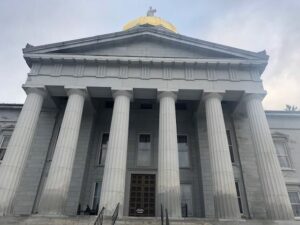Oregon voters approved a change to the state’s constitution, stripping language that for more than a century has allowed for slavery and involuntary servitude as punishment for a crime. As of Thursday morning, 55% of voters were backing Measure 112, unofficial results show.
And for many, that’s disturbingly close.
“Removing language referencing slavery from the Oregon Constitution is a good thing and is long over due,” said Rep. Travis Nelson, D-Portland, who won election Tuesday as state’s first Black, openly LGBTQIA+ lawmaker.
Yet, more than 686,000 Oregonians, or about 45% who voted on the measure, opted to keep slavery and involuntary servitude a lawful punishment for people convicted of crimes.
“It’s a big number,” Nelson said. “That’s troubling to me.”
With few exceptions, counties that leaned Republican in the race for governor voted against Measure 112, according to early returns. Those that leaned Democrat voted to pass Measure 112.
When Oregon became a state in 1859, it prohibited slavery in its constitution, but the state also had racist laws, such as prohibiting Black people from moving to the state.
“This was a state that was meant to be a white utopia and was not welcoming to people who were not white,” Nelson said. “Given the history of Oregon, the results that have come from Measure 112 are disappointing, but not incredibly surprising.”
Proponents said Measure 112 was about removing antiquated language from the state’s cornerstone legal document and affirming modern anti-slavery values.
“We have conversations all the time about our Oregon values, and now we know that there’s a segment of the population that values slavery being a form of punishment,” said Jennifer Parrish-Taylor, director of advocacy and public policy at the Urban League of Portland, which backed Measure 112.
“That’s a hard conversation, but I think it’s also reflective of the broader national conversation that we’re seeing just in terms of this rise of white nationalism, of racial hatred that’s happening, folks feeling further and further isolated and disconnected from each other,” Parrish-Taylor said.
Four other states had similar initiatives on the ballot this year. Voters in Vermont, Tennessee and Alabama passed measures removing references to slavery in their constitutions. Confusion over the language before voters in Louisiana led even some supporters of that measure to call for votes against it over concerns the proposed language could technically make involuntary servitude and slavery legal. Though, that’s prohibited by federal law. Rhode Island, Nebraska, Utah and Colorado previously banned slavery in any form.
“The most surprising thing I might argue, is that in Oregon, what we might consider a progressive, liberal state, the win was actually by a smaller margin than in many of the other deep red states,” Bianca Tylek, executive director of Worth Rises, a nonprofit that advocates for people who are incarcerated as well as their families. “You expected a win, but you expected a win unequivocally.”
Tylek called Oregon’s results “shockingly close.” Still, Oregon is among the eight states to unequivocally and without exception, abolish slavery, she said. She hopes to use the momentum towards a similar change to the U.S. Constitution through an amendment introduced by Sen. Jeff Merkley, D-Oregon.
Many state constitutions mirror language in the U.S Constitution’s 13th Amendment, which abolished slavery, but made exceptions for slavery as a punishment for a crime. Black Americans continued to be arrested under false pretenses after the Civil War, which allowed slavery to continue, Merkley said in a news release following this week’s midterm elections.
“This horrific loophole in our Constitution is a moral abomination that launched the mass incarceration we see continuing to this day,” he said. “On Tuesday, voters in Oregon and other states came together across party lines to say that this stain must be removed from state constitutions.”
Merkley said that the same exception must now be removed from the U.S. Constitution because “there should be no exceptions to a ban on slavery.”
In Oregon, there was no formal opposition campaign to Measure 112, though the Oregon State Sheriffs’ Association opposed it. In the days since the election, the association has not responded to requests for comment.
In a statement filed with the Secretary of State’s Office and published in the state’s voter guide, the sheriffs association said they “do not condone or support slavery and/or involuntary servitude in any form. With this being said, Oregon Sheriffs cannot support Measure 112 as drafted — it creates unintended consequences for Oregon Jails that will result in the elimination of all reformative programs and increased costs to local jail operations.”
The Oregon Department of Corrections also raised concerns about Measure 112 before state lawmakers voted to put it on the ballot last year. A spokeswoman for the DOC said Wednesday it did not have a comment on the unofficial election results.
A fiscal analysis published by the Oregon Secretary of State prior to the election found the measure didn’t require additional state dollars, but “the impact of the measure will depend on potential legal action or changes to inmate work programs.”
Carceral systems in Oregon and nationally operate off the labor of those who are in custody, and in the case of the Oregon Department of Corrections, pay people in custody as little as $8 per month, according to the agency.
“If you can’t unequivocally finish the sentence: ‘Slavery is OK when’ – then you must believe in ending slavery in every single circumstance for everyone,” Tylek said. “The idea that we don’t end slavery because we’re afraid of the consequences acknowledges that slavery is what’s holding up our carceral system.”
Sandy Chung, executive director of ACLU of Oregon, which supported Measure 112, said she heard from some voters who were confused and thought the slavery and involuntary servitude language was necessary to hold people accountable who committed crimes. The measure was explicitly written to incorporate work requirements Oregon voters passed in 1994. Chung said that despite getting out education to voters, it didn’t reach everyone.
“Most people we spoke with, including groups who opposed Measure 112, like Oregon sheriffs’ association, no one in Oregon supports slavery,” she said.
In 2016, Colorado voters shot down a ballot measure that would’ve removed slavery from its constitution.
“There was a confusion around the ballot language and when they won in 2018 it was a pretty resounding win,” Tylek said.
Like others, the Urban League’s Parrish-Taylor said she was glad Measure 112 passed in Oregon. Though the number of Oregonians to vote against it, she said, is just too large to be explained as merely voter confusion.
“Quite frankly, I think there are some folks that have that sentiment of racial animosity,” Parrish-Taylor said.
She called on the state and community for “self reflection as to why folks were against taking this out of the constitution.” She said it could be reflective of where those Oregonians might be on other issues.
“We see this in other spaces where there’s been just a backlash to policies that center equity, that center communities of color,” she said. “So how do we have those dialogues and hard conversion and build bridges to show that just because we are centering one population, it’s not to the detriment of other populations.”
The passage of Measure 112 is painfully revealing, and even discouraging, for some. The surprisingly close race has overshadowed what for many is also a victory: Oregonians voted to remove slavery as a legal form of punishment for a crime.
“The number of people who voted against it shows very clearly the legacy of white supremacy and institutional racism in the state and the importance of needing to push forward,” said Bobbin Singh, executive director of the Oregon Justice Resource Center, a nonprofit that also backed Measure 112.
“The fact that it won is the more important part of the story — that Oregonians wanted to change this part of the constitution.”




